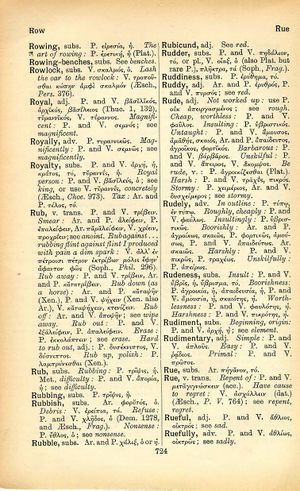rubbish: Difference between revisions
From LSJ
Έγ', ὦ ταλαίπωρ', αὐτὸς ὧν χρείᾳ πάρει. Τὰ πολλὰ γάρ τοι ῥήματ' ἢ τέρψαντά τι, ἢ δυσχεράναντ', ἢ κατοικτίσαντά πως, παρέσχε φωνὴν τοῖς ἀφωνήτοις τινά –> Wretched brother, tell him what you need. A multitude of words can be pleasurable, burdensome, or they can arouse pity somehow — they give a kind of voice to the voiceless.
(CSV4) |
m (Text replacement - "<b class="b2">Frag.</b>" to "''Frag.''") |
||
| Line 3: | Line 3: | ||
Ar. [[φορυτός]], ὁ. | Ar. [[φορυτός]], ὁ. | ||
<b class="b2">Debris</b>: V. ἐρείπια, τά. | <b class="b2">Debris</b>: V. ἐρείπια, τά. | ||
<b class="b2">Refuse</b>: P. and V. [[χλῆδος]], ὁ (Dem. 1278, and Aesch., | <b class="b2">Refuse</b>: P. and V. [[χλῆδος]], ὁ (Dem. 1278, and Aesch., ''Frag.''). | ||
<b class="b2">Nonsense</b>: P. [[ὕθλος]], ὁ; see [[nonsense]]. | <b class="b2">Nonsense</b>: P. [[ὕθλος]], ὁ; see [[nonsense]]. | ||
}} | }} | ||

